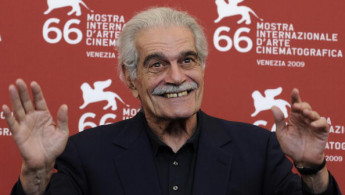Diary of iconic actor Omar Sharif to be turned into drama series for first time
Egyptian novelist and scriptwriter Haitham Dabour has acquired the copyrights of turning the diaries of iconic actor Omar Sharif into a drama series for the first time, the award-winning writer posted Tuesday on his official Facebook page.
“Sharif’s autobiography covers his early years as an up-and-coming Egyptian actor ascending to fame in Hollywood, while also shedding light on his parallel career as a professional bridge player,” Dabour wrote in the statement, adding that “Sharif’s autobiography was very honest and raw.”
According to Dabour, "Sharif’s only son, Tarek, has been backing the project, hoping the series would land on a major streaming platform.”
Dabour quoted Tarek Sharif as saying: “I am looking forward to watching my father’s legacy in a production that is worthy of his memory and matches up to his status in film history.”
No data has been announced yet as to when the project will be finalised.
Tarek Sharif is also the son of late legendary Egyptian actress Faten Hamama, dubbed by critics and her fans as the ‘Lady of the Arab Screen’.
Arguably one of the most influential film stars of all time, Sharif, an Egyptian national with Syrian-Lebanese origins, has turned from being a local celebrity into an international actor in less than a decade of commencing his artistic career.
Born in 1932 in the Mediterranean city of Alexandria to Catholic parents and going by the name Michel Dimitri Chalhoub, Sharif acquired a dual college degree in mathematics and physics, before working with his father on the family business as wood trader for a while.
He paved his way into the world of cinema in 1954 by acting in a film entitled 'Shayateen El-Sahara' (The Devils of the Desert).
In 1954, he met Hamama during the shooting of 'Seraa fil Wadi' (A Struggle in the Valley). The couple fell in love and got married one year later after he converted to Islam and changed his name.
The couple co-starred several other films in the following years. In 1957, they had their only son, Tarek.
Sharif starred in many other movies until he won a part as Sherif Ali in David Lean's 'Lawrence of Arabia' in 1962, securing him a place in international cinema and acquiring him several international awards. In 1965 he played the lead role in another classic directed by Lean, 'Doctor Zhivago'.
The couple got divorced in 1974 for Sharif was living abroad and Hamama remained in Egypt.
Sharif acted in English and French, two of many languages he was fluent in. As an elderly, he starred in the dramatic monologue in French 'Monsieur Ibrahim et Les Fleurs du Coran' (Monsieur Ibrahim and The Flowers of the Quran) (2003), which won international awards and critical acclaims alike.
In the last years of his career, Sharif returned to his homeland and took part in a few local movies, the last of which was the 2008 social drama ‘Hassan Wa Morcus’ (Hassan and Morcus), co-starring Egyptian renowned actor Adel Imam. The plot is about religious strife between Muslims and Coptic Christians in the country tackled in a comic way.
In 2012, Sharif got diagnosed with Alzheimer’s; three years later he died of a heart attack in Cairo, almost six months after the love his life, Hamama, had passed away. Sharif has been survived by his son, Tarek, and his grandson, Omar.





 Follow the Middle East's top stories in English at The New Arab on Google News
Follow the Middle East's top stories in English at The New Arab on Google News
![The UAE is widely suspected of arming the RSF militia [Getty]](/sites/default/files/styles/image_330x185/public/2024-11/GettyImages-472529908.jpg?h=69f2b9d0&itok=Yauw3YTG)
![Netanyahu furiously denounced the ICC [Getty]](/sites/default/files/styles/image_330x185/public/2024-11/GettyImages-2169352575.jpg?h=199d8c1f&itok=-vRiruf5)
![Both Hamas and the Palestinian Authority welcomed the ICC arrest warrants [Getty]](/sites/default/files/styles/image_330x185/public/2024-11/GettyImages-2178351173.jpg?h=199d8c1f&itok=TV858iVg)